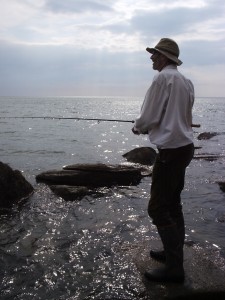This patient, laconic set of fisherman’s reflections is nature writing at its most alive, says Adam Nicolson in today’s Telegraph
Fishing is “the contemplative man’s recreation”, Izaak Walton wrote in the 1650s – a retreat from public life and civil war into a kind of insulated bliss.
Angling was Walton’s “imployment for his idle time, which was not idly spent”. It was a “rest to his mind, a cheerer of his spirits, a divertion of sadness, a calmer of unquiet thoughts, a Moderator of passions, a procurer of contentedness, [which] begot habits of peace and patience in those that profest and practic’d it.” Fishing and philosophy were the same thing.
For a long time Chris Yates was the record-holder for the largest carp caught in England (51½ lbs) and says he is a fisherman first, a photographer second and, apparently, a writer third. It is the most Walton-like of claims, the sort of thing a man would say who had spent year after year casting and re-casting into almost unresponsive ponds. But if it is true, he must be a dazzling photographer and an extraordinary fisherman because there is more beautiful, securely thought, elegantly expressed and subtly responsive writing in this tiny book than in volume after volume that make far greater claims to “literature”.
Out of the Blue is framed as 22 miniature scenes, in which Yates, first as a boy, and then again as late-coming man, after a lifetime in ponds and rivers, falls in love with the life of the shore and shallow seas. He coasts about a little with a friend in a dinghy but there is no deep sea-voyaging here. This is all about the mysterious and life-promising edge of cliffs, rock pools and swirling tides, in all of which “the mysterious potential of water” repeatedly delivers its miracles. Day after day – and it is written almost as a consecutive series of daily accounts – he conveys an air of calm.
There is no soapbox (beyond a mildly expressed green agenda), no stomping, no landscape-dominating posture but instead a form of nurtured privacy, a slow and patient intimacy with the natural world, lit up by the purely seductive ability to make that moment of questioning recognition really vivid, seeing the form of a fish in a pool, thinking it a shadow, seeing it as a fish again before losing it in the ripples of the flooding tide. The way he writes seems casual but it is filled with one of the marks of excellence: repeatedly daring to dwell in the nearly contentless moment, dallying in and out of the edges of the banal, when nearly nothing happens, and the swell is slopping emptily beside him. But it is an uneventfulness that lets him see the smallest of details in the highest of profiles:
“As I reeled up my line and shouldered my bag, I glimpsed a subtle swirl 50 yards in front of me. It was as if the water had been touched by a slowly meandering draught of air which faded almost as soon as I noticed it. After a few moments it re-stirred, advancing towards me, weaving left and right, trailing a row of shallow impressions on the surface, like a ghost’s footprints.”
Once you have read that, won’t you watch for fish in the sea rather differently?
There is a kind of loneliness in this writing. Yates is a single father of four children, his “tribe”, as he calls them (nothing is said of their mother or her absence), and friends appear now and then, but he is essentially alone, and the way he writes about the coastal landforms and the mysterious beauties of the wrasses and pollack hidden in their waters, seems as solitary, as deceptively laconic and easy, as the poetry of Robert Frost. Frost said that “literature begins with geography”; I don’t know anyone today who is making that connection as alive as this.
The bass, Dicentranchus labrax, is the king of the book, the hero of repeated epiphanies of closeness, always conveyed and described, never theorised or stood back from, and always renewable. Again and again the bass comes to the landing net, “where it [lies] quiet but still wild-looking, its big gold-rimmed eye staring defiantly, its fins bristling. When I lifted it up I felt its voltage returning and half expected lightning to spark from its silver scales“. On another magical morning, in the half-light just before dawn, he lands another on which “every scale along the flank picked out a little moon”.
And sometimes they come nearly to the boat or to the rock on which he is standing, but the barbless hooks slip, “and some great marauding bass sails free”. The curious sensation is that, for us anyway, the escape feels just as good as the capture.
